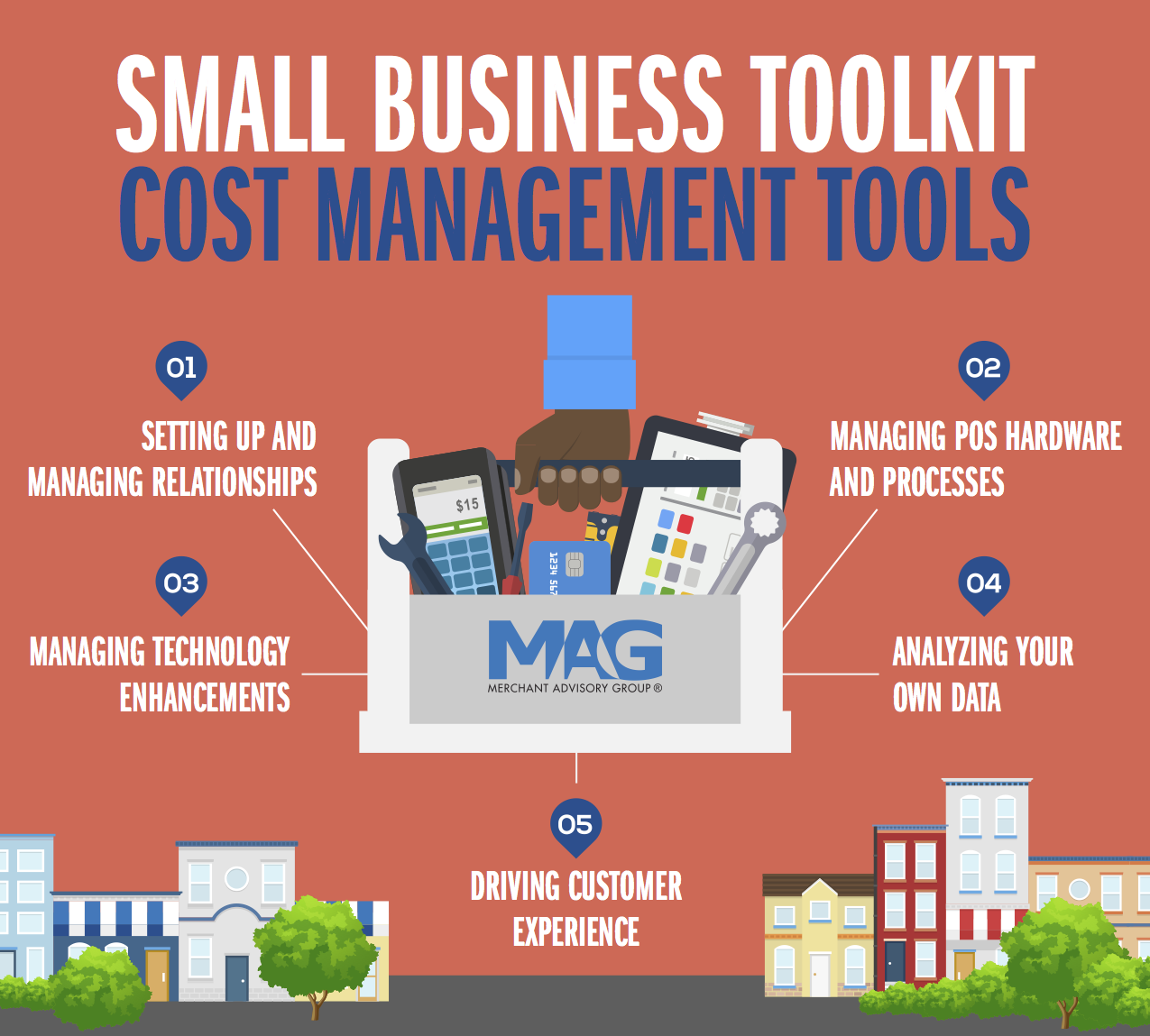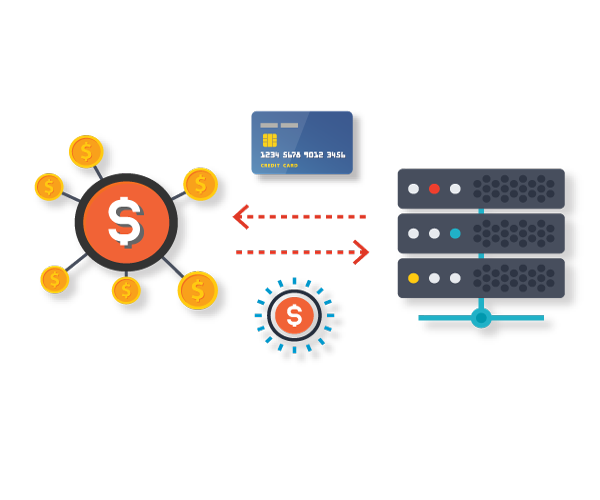Cost Management Toolkit

Setting Up and Managing Relationships
- Your relationship with your merchant acquirer/ merchant processor is the most important business relationship you have in trying to understand your cost of accepting payments.
- Have a straightforward conversation with whoever you purchase payment services from where you ask them to explain the total cost of accepting payments. Many small businesses see a blended rate of acceptance, which makes it difficult to tell where the biggest fees are.
- There are three main components to payment acceptance: Interchange Costs, Network Fees, and Processor Fees (including other add-on fees). Interchange fees are generally non-negotiable rates set by card networks that is flow-through revenue to the card issuer. Network fees are also generally non-negotiable and are fees determined by major card networks, such as Visa and MasterCard. Processor fees and other add-on services are the fees you can negotiate on with your payments provider. “Blended” or “Bundled” rates make these individual fees difficult to understand and hard to track. Consider asking your processor to provide pricing based on the cost components above.
- There’s a tremendous amount of competition for processing services so you should feel empowered to haven a direct and transparent conversation with your payment service provider. If you feel like you are not getting the answers you need, have a discussion with other processors and acquirers. Here are a few potential questions to start with:
- Q: As a merchant, is there anything I can do to reduce my costs of payment card acceptance?
- Q: How do you determine the prices I pay to accept different card brands (V/MC/A/D), different card levels (Basic, Rewards, Premium), and different products (Debit vs. Credit)?
- Q: How will you keep me informed of changes to
pricing and operational procedures going forward? - Q: How is my business performance on chargebacks and downgrades, especially compared to similar merchants?
Managing POS Hardware and Processes
- There are ways to reduce your costs on the ‘non-negotiable’ costs noted above. Chargebacks and interchange downgrades can quickly add to your overall costs of accepting cards and some of them can be avoided.
- Talk to your payment provider about what savings you should be getting on debit transactions and consider asking them to “unbundle” your debit and credit fees. For PIN and Signature Debit, Federal law limits the amount that you can be charged on big bank ($10 Billion in assets or greater) transactions to roughly 24 cents. Credit card interchange fees in the US are usually more than 2% on every transaction. Credit card interchange fees are unregulated and U.S. businesses pay some of the highest rates in the world. Merchants are not required to accept both the credit and debit products when accepting a particular card network brand.
- Analyze how many monthly chargebacks you get at your business and analyze whether or not POS changes or upgrades make sense for your business. Potential upgrades include EMV deployment, tokenization solutions, and point-to-point encryption. In the short-term, to limit chargeback liability loss, you may want to consider capturing the 3-digit security code on the card If you are entering the card number by hand instead of through a magnetic stripe swipe or chip card dip. You likely want to capture this additional card information anyway because hand-keyed transactions have some of the highest fees for in-person transactions and are most susceptible to fraud. Also, consider implementing a swipe and compare processes whereby you compare the last four digits printed on the card and the last four digits read by your POS; if they are not the same, don’t take the card.
- In either case, you should ask your acquirer to show you how typical your costs are for these items relevant to other similar merchants and take action where possible.
Managing Technology Enhancements
- For debit card transaction, several large merchants employ a process called “Smart Routing” in which they work with their merchant acquirer/payment service provider to ensure debit card transactions route to the most cost efficient and/or secure network. Some merchants make these decisions based on volume-based agreements with networks, but the majority are based on the network fees, interchange fees, and payment guarantee (or lack thereof) associated with a certain network. Even if you’re a small merchant, you may want to talk to your acquirer about these services.
- You may want to consider asking for PIN whenever a card supports it and it operationally makes sense to request it. A PIN transaction is much more secure than a signature transaction and may reduce your costs and chargebacks.
- If you are trying to decide if accepting a mobile or digital wallet makes sense for your business, there are several factors to consider, including the cost, security, and customer experience with those wallets. One of the most important things to consider is what types of transactions will you be cannibalizing, and how will that impact your business and costs. For example, millennials have a strong propensity to use cash, which is often cheaper to accept than cards, so if a mobile device has the same or a more costly structure than card acceptance, and you cannibalize a high number of cash transactions by deploying mobile, it may not make sense for your business as long as consumer demand for digital wallet acceptance remains low. For a more detailed list of analysis questions view our mobile tool at www.ismobileforyou.com
Analyzing your own data
- After a detailed discussion with your acquirer, take some time to review your monthly statements in detail and scrutinize items you have follow-up questions about. Then, talk to your current acquirer or payment systems provider if you think you see room for improvement. Consider getting bids from other providers.
- In addition, find ways to summarize your performance trends ongoing so that you can see when you have issues that crop up and cost you excess money. This includes monitoring your chargebacks stats as well as your interchange downgrades.
Driving customer experience
- Private label & brand-specific (closed-loop) gift cards are some of the most efficient, low costs, cards for merchants to process. If you have these payment options available for your business and have the ability to encourage customers to use either form of payment, you may want to consider these options.
- You also have legal rights to provide your customers discounts or incentives to pay with cash, checks, or debit cards. If these are lower cost payments for you to accept, you may want to consider providing such discounts and incentives that provide savings and benefits to business and customers.
- As noted in the Technology Enhancements section, you have the right to send transactions however you choose based on pre-determined decisions with your acquirer. When you set-up your payment terminals to support new technologies, be sure they work in manner that enhances the consumer experience without inhibiting merchant choice. For example, if you are deploying a mobile commerce solution, be sure your costs and chargeback rights do not negatively change, and that the authentication mechanism (i.e. fingerprint biometric) used on the new technology affords you the same rights and opportunities as other payments.
